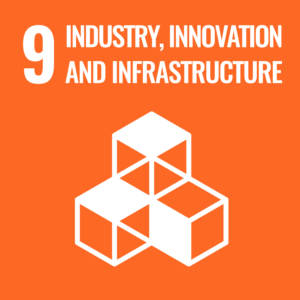
Sustained investment in infrastructure and innovation are crucial drivers of economic growth and development. Tourism development relies on good public and private infrastructures. The sector can influence public policy for infrastructure upgrade and retrofit, making them more sustainable, innovative and resource-efficient and moving towards low carbon growth, thus attracting various sources of foreign investment. Furthermore, tourism promotion could attract financial investment for construction of social infrastructure.
There are five targets within SDG 9 that are deemed to have a ensure the promotion of inclusive and sustainable industrialization and innovation. These targets have been selected to base the potential project indicators.
TARGET 9.1
DEVELOP QUALITY, RELIABLE, SUSTAINABLE AND RESILIENT INFRASTRUCTURE, INCLUDING REGIONAL AND TRANSBORDER INFRASTRUCTURE, TO SUPPORT ECONOMIC DEVELOPMENT AND HUMAN WELL-BEING, WITH A FOCUS ON AFFORDABLE AND EQUITABLE ACCESS FOR ALL.
Tourism’s contribution to Target 9.1 can be seen through the improvement of visitor accessibility, including regional and transborder infrastructure which supports the economic development and well-being of local residents. Quality, reliable, and sustainable infrastructure affects different key areas which in different ways will enhance the delivery of tourism services, while benefiting the local populations. The development of transportation infrastructure, such as road, airport and ports in the context of tourism sector development, will diversify the logistics and decrease the time dedicated to transportation. Improvement of accessibility of transportation infrastructure for all may contribute to the increase of the number of visitors and the success/growth of tourism businesses.
Potential indicators in this target are grouped by the following Theme and sub-theme:
Infrastructure / Transport
Business Development / MSMEs
Education and training / Capacity building
Financing / Access to finance
TARGET 9.3
INCREASE THE ACCESS OF SMALL-SCALE INDUSTRIAL AND OTHER ENTERPRISES, IN PARTICULAR IN DEVELOPING COUNTRIES, TO FINANCIAL SERVICES, INCLUDING AFFORDABLE CREDIT, AND THEIR INTEGRATION INTO VALUE CHAINS AND MARKETS.
By improving access to financial services for tourism businesses, in particularly MSMEs, as well as supporting the integration into the local tourism sector, tourism enterprises can potentially grow and improve their means of production or operation methods and boosting local productivity. Adequate funding can support the development of innovation and digitalization in tourism and their application in business operations, as well as enhancing the travel experience, largely transforming the sector as an important source of direct employment and integration of small-scale enterprises into tourism value chains and markets.
Potential indicators in this target are grouped by the following Theme and sub-theme:
Business Development / MSMEs
Education and training / Capacity building
Financing / Access to finance
TARGET 8.4
BY 2030, UPGRADE INFRASTRUCTURE AND RETROFIT INDUSTRIES TO MAKE THEM SUSTAINABLE, WITH INCREASED RESOURCE-USE EFFICIENCY AND GREATER ADOPTION OF CLEAN AND ENVIRONMENTALLY SOUND TECHNOLOGIES AND INDUSTRIAL PROCESSES, WITH ALL COUNTRIES TAKING ACTION IN ACCORDANCE WITH THEIR RESPECTIVE CAPABILITIES.
Tourism is a resource-intensive sector. Energy and water are essential for business operations and the comfort of clients. The majority of means of transport, such as airplanes, buses, and cars still use fossil fuels. However, there are opportunities for the transition to a net zero carbon sector and many efforts have already been made in the tourism sector. Tourism businesses can contribute to this target by upgrading infrastructures and retrofitting industries to make them more sustainable, to increase resource-use efficiency, and to adopt clean and environmentally sound technologies and processes. The certification of sustainable tourism practices for tourism businesses can provide, inter alia, an incentive for the integration of the main elements of sustainable tourism, improving good management practices and reducing the environmental and social impacts of services.
Potential indicators in this target are grouped by the following Theme and sub-theme:
Tourism value chain / Tourism operations
Sustainable consumption and production patterns / Sustainable operations
TARGET 9.5
ENHANCE SCIENTIFIC RESEARCH, UPGRADE THE TECHNOLOGICAL CAPABILITIES OF INDUSTRIAL SECTORS IN ALL COUNTRIES, IN PARTICULAR DEVELOPING COUNTRIES, INCLUDING, BY 2030, ENCOURAGING INNOVATION AND SUBSTANTIALLY INCREASING THE NUMBER OF RESEARCH AND DEVELOPMENT WORKERS PER 1 MILLION PEOPLE AND PUBLIC AND PRIVATE RESEARCH AND DEVELOPMENT SPENDING.
This target relates to the scientific research and technological capabilities through innovation and research and development. The tourism sector can contribute to this target by improving business efficiency by promoting innovation, digital transformation and ICT. Harnessing innovation and digital advances provide tourism with opportunities to become more sustainable and resilient, as well as to improve inclusiveness, local community empowerment, or efficient resource management.
Potential indicators in this target are grouped by the following Theme and sub-theme:
Business Development / MSMEs
Business Development / Innovation
Business Development / Research and development
TARGET 9.c
SIGNIFICANTLY INCREASE ACCESS TO INFORMATION AND COMMUNICATIONS TECHNOLOGY AND STRIVE TO PROVIDE UNIVERSAL AND AFFORDABLE ACCESS TO THE INTERNET IN LEAST DEVELOPED COUNTRIES BY 2020.
The tourism sector has seen a significant increase in the number of digital platforms and online services such as online travel agents, booking engines, etc. This has not only assisted in attracting tourists but also in connecting businesses. For both visitors and the local tourism business, high-speed Internet connection has become an essential infrastructure to reap the benefits of digital transformation. The availability of affordable access enables local tourism operators to connect with global markets and facilitates the promotion and marketing of a destination to potential visitors. This issue is closely related to infrastructure development as it highlights the importance of investing in ICT infrastructure to support the growth of the tourism sector.
Potential indicators in this target are grouped by the following Theme and sub-theme:
Information and communication technology / Internet connectivity
Information and communication technology / Digital transformation
Education and training / ICT training

